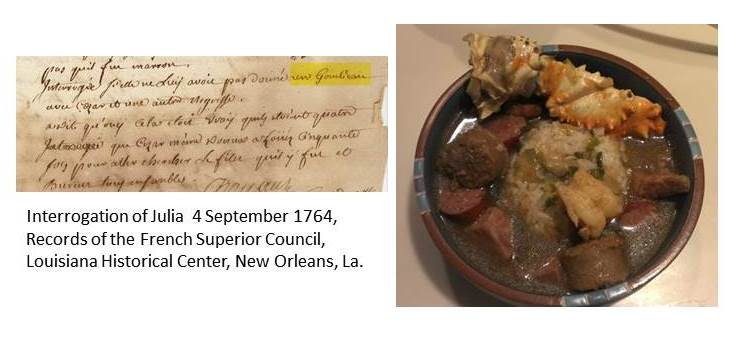National Gumbo Day!
It’s National Gumbo Day!
And all Louisianans know nothing stirs the emotions like a discussion about food. But we all know the answers to the questions often asked by visitors to New Orleans, “Who makes the best gumbo in the city?” The typical reply is, “My mama.” Or “Where do I go to eat the best gumbo in the city?” That answer is, “My kitchen.” Because our mamas taught us to make our gumbos.
So what’s all the fuss about? Firstly, Gumbo is the official cuisine of Louisiana. Easy to understand why any origins to the dish would then elevate a group to a special status. However the name of the dish itself is a perfect analogy to the culture of Louisiana, it’s a mixed pot.
The first reference to ”gombeau” in New Orleans was in 1764 discovered by Louisiana colonial historian Gwendolyn Midlo Hall. It’s a record of testimony written in French and archived in the records of the French Superior Council. Of course this does not mean others who lived in the territory before 1764 were not making the dish, but often the reference to 1802 as the first record of gumbo is incorrect. In 1764 we know where in the world people came from who lived in the colony and who they found living there upon arrival. We know the Choctaw, an indigenous Louisiana people thickened soups using filé, still used today to thicken many gumbos and some believe used the term ‘kombo-lichi’ to refer to such dishes. We know ki ngombo is the Bantu word for okra, another staple used in some gumbos. And today, we know a good gumbo requires a roux, a mixture of flour and a fat like butter, used in classical French cooking as a thickening agent. But these facts still don’t answer the question about the origin of the dish. Maybe that’s a good thing because like all those ingredients put in a gumbo pot, what comes out is something special and unique. Just like me and everyone out there with Louisiana roots.
Happy Sunday Gumbo Day!

Thanks for stopping by Teresa. Yep, we have a pretty cool and old history. I LOVE learning about all the cultures that added to the American pot!
Pretty cool history about gumbo! Now I have a hankering for a bowl…